一般过去时句型转换
- 格式:docx
- 大小:16.57 KB
- 文档页数:3
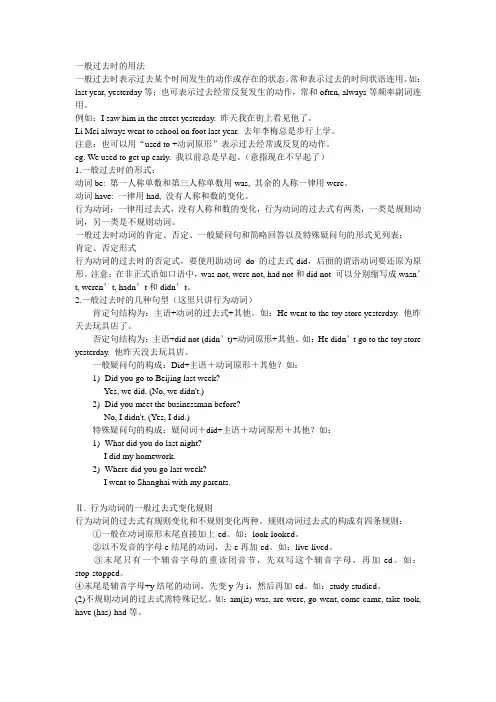
一般过去时的用法一般过去时表示过去某个时间发生的动作或存在的状态。
常和表示过去的时间状语连用。
如:last year, yesterday等;也可表示过去经常反复发生的动作,常和often, always等频率副词连用。
例如:I saw him in the street yesterday. 昨天我在街上看见他了。
Li Mei always went to school on foot last year. 去年李梅总是步行上学。
注意:也可以用“used to +动词原形”表示过去经常或反复的动作。
eg. We used to get up early. 我以前总是早起。
(意指现在不早起了)1.一般过去时的形式:动词be: 第一人称单数和第三人称单数用was, 其余的人称一律用were。
动词have: 一律用had, 没有人称和数的变化。
行为动词:一律用过去式,没有人称和数的变化,行为动词的过去式有两类,一类是规则动词,另一类是不规则动词。
一般过去时动词的肯定、否定、一般疑问句和简略回答以及特殊疑问句的形式见列表:肯定、否定形式行为动词的过去时的否定式,要使用助动词do 的过去式did,后面的谓语动词要还原为原形。
注意:在非正式语如口语中,was not, were not, had not和did not 可以分别缩写成wasn’t, weren’t, hadn’t和didn’t。
2.一般过去时的几种句型(这里只讲行为动词)肯定句结构为:主语+动词的过去式+其他。
如:He went to the toy store yesterday. 他昨天去玩具店了。
否定句结构为:主语+did not (didn’t)+动词原形+其他。
如:He didn’t go to the toy store yesterday. 他昨天没去玩具店。
一般疑问句的构成:Did+主语+动词原形+其他?如:1) -Did you go to Beijing last week?-Yes, we did. (No, we didn't.)2) -Did you meet the businessman before?-No, I didn't. (Yes, I did.)特殊疑问句的构成:疑问词+did+主语+动词原形+其他?如:1) -What did you do last night?-I did my homework.2) -Where did you go last week?-I went to Shanghai with my parents.Ⅱ. 行为动词的一般过去式变化规则行为动词的过去式有规则变化和不规则变化两种。
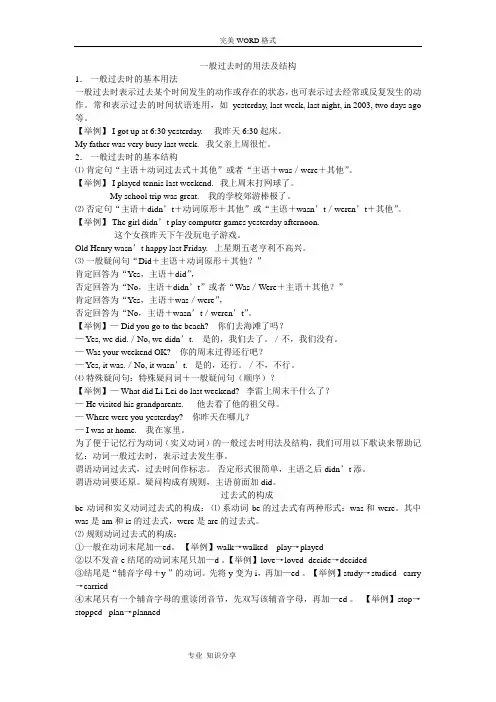
一般过去时的用法及结构1.一般过去时的基本用法一般过去时表示过去某个时间发生的动作或存在的状态,也可表示过去经常或反复发生的动作。
常和表示过去的时间状语连用,如yesterday, last week, last night, in 2003, two days ago 等。
【举例】 I got up at 6:30 yesterday. 我昨天6:30起床。
My father was very busy last week. 我父亲上周很忙。
2.一般过去时的基本结构⑴肯定句“主语+动词过去式+其他”或者“主语+was/were+其他”。
【举例】 I played tennis last weekend. 我上周末打网球了。
My school trip was great. 我的学校郊游棒极了。
⑵否定句“主语+didn’t+动词原形+其他”或“主语+wasn’t/weren’t+其他”。
【举例】 The girl didn’t play computer games yesterday afternoon.这个女孩昨天下午没玩电子游戏。
Old Henry wasn’t happy last Friday. 上星期五老亨利不高兴。
⑶一般疑问句“Did+主语+动词原形+其他?”肯定回答为“Yes,主语+did”,否定回答为“No,主语+didn’t”或者“Was/Were+主语+其他?”肯定回答为“Yes,主语+was/were”,否定回答为“No,主语+wasn’t/weren’t”。
【举例】— Did you go to the beach? 你们去海滩了吗?— Yes, we did./No, we didn’t. 是的,我们去了。
/不,我们没有。
— Was your weekend OK? 你的周末过得还行吧?— Yes, it was./No, it wasn’t. 是的,还行。
/不,不行。
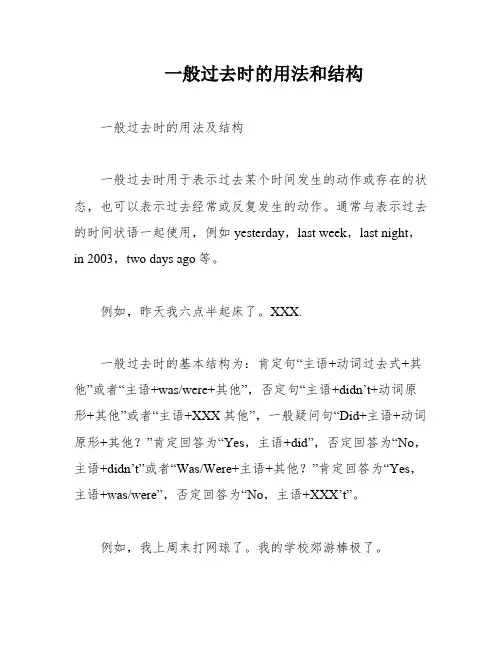
一般过去时的用法和结构一般过去时的用法及结构一般过去时用于表示过去某个时间发生的动作或存在的状态,也可以表示过去经常或反复发生的动作。
通常与表示过去的时间状语一起使用,例如yesterday,last week,last night,in 2003,two days ago等。
例如,昨天我六点半起床了。
XXX.一般过去时的基本结构为:肯定句“主语+动词过去式+其他”或者“主语+was/were+其他”,否定句“主语+didn’t+动词原形+其他”或者“主语+XXX其他”,一般疑问句“Did+主语+动词原形+其他?”肯定回答为“Yes,主语+did”,否定回答为“No,主语+didn’t”或者“Was/Were+主语+其他?”肯定回答为“Yes,主语+was/were”,否定回答为“No,主语+XXX’t”。
例如,我上周末打网球了。
我的学校郊游棒极了。
这个女孩昨天下午没玩电子游戏。
上星期五老XXX不高兴。
特殊疑问句的结构为:特殊疑问词+一般疑问句(顺序)?例如,XXX上周末干什么了?他去看了他的祖父母。
你昨天在哪儿?我在家里。
为了帮助记忆实义动词一般过去时的用法和结构,我们可以使用以下歌诀:“动词一般过去时,表示过去发生事。
谓语动词过去式,过去时间作标志。
否定形式很简单,主语之后加didn't。
谓语动词要还原。
疑问构成有规则,主语前面加did。
”过去式的构成有两种方式:be动词和实义动词。
系动词be的过去式有两种形式:was和were。
其中,was是am和is的过去式,were是are的过去式。
实义动词过去式的构成有以下几种规则:1.一般在动词末尾加-ed,例如walk→walked,play→played;2.以不发音e结尾的动词末尾只加-d,例如love→loved,decide→decided;3.以“辅音字母+y”结尾的动词,先将y变为i,再加-ed,例如study→studied,carry→carried;4.末尾只有一个辅音字母的重读闭音节,先双写该辅音字母,再加-ed,→ped,plan→planned。
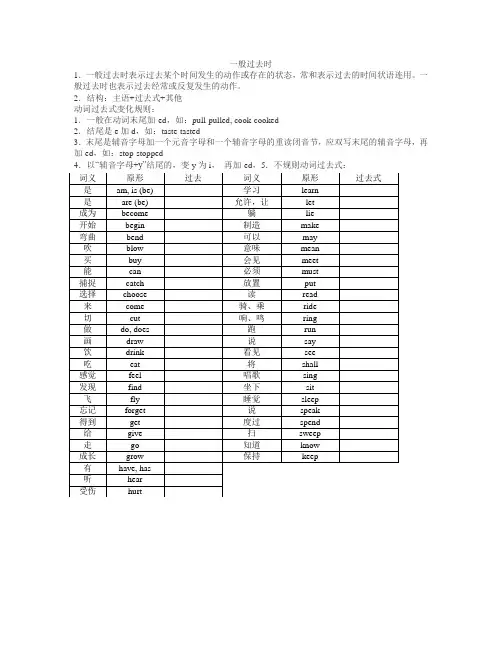
一般过去时1.一般过去时表示过去某个时间发生的动作或存在的状态,常和表示过去的时间状语连用。
一般过去时也表示过去经常或反复发生的动作。
2.结构:主语+过去式+其他动词过去式变化规则:1.一般在动词末尾加-ed,如:pull-pulled, cook-cooked2.结尾是e加d,如:taste-tasted3.末尾是辅音字母加一个元音字母和一个辅音字母的重读闭音节,应双写末尾的辅音字母,再加-ed,如:stop-stopped4.以“辅音字母+y”结尾的,变y为i,再加-ed,5.不规则动词过去式:三、句型转换:一般过去式看动词,动词必须用过去式,变一般疑问句先找be 和情态动词,若有提前并大写,若无借助于did,实义动词要还原。
变否定句先找be 和情态动词,若有再后加not,若无借助于didn’t,实义动词要还原。
特殊疑问句由疑问词+一般疑问句构成。
四、标志词:1. yesterday、last+时间、时间+ago、just now、in+过去的时间一、单项选择:从下列各题后所给的四个选项中选择最佳答案填空。
(10)( )1.My father______ill yesterday.A.isn't B.aren't C.wasn't D.weren't( )2.______your parents at home last week﹖A.Is B.Was C.Are D.Were( )3.The twins______in Dalian last year.They______here now.A.are; were B.were; are C.was; are D.were; was ( )4.______your father at work the day_____yesterday(前天)﹖A.Was; before B.Is; before C.Was; after D.Is; after ( )5.—Who was on duty last Friday﹖—______.A.I am B.I was C.Y es, I was D.No, I wasn't ( )6. I cleaned my classroom ___________.A with three hoursB three hours agoC in three hoursD three hours before( ) 7. I came _______ my house two days ago .A back onB back toC to backD back( ) 8 . ___________? He did some reading at home.A What does your father do yesterday eveningB What does your brother do in the schoolC What did your brother do over the weekendD Where did your brother go last Sunday( ) 9. What did you do ________ ? I went to the movies.A next morning Bover the weekend C in the weekend D next Monday( ) 10. The koala sleeps _______,but gets up _________.A during the day; at the eveningB at day ;during nightC in the day ;during the eveningD during the day ; at night二、请用正确动词形式填空。
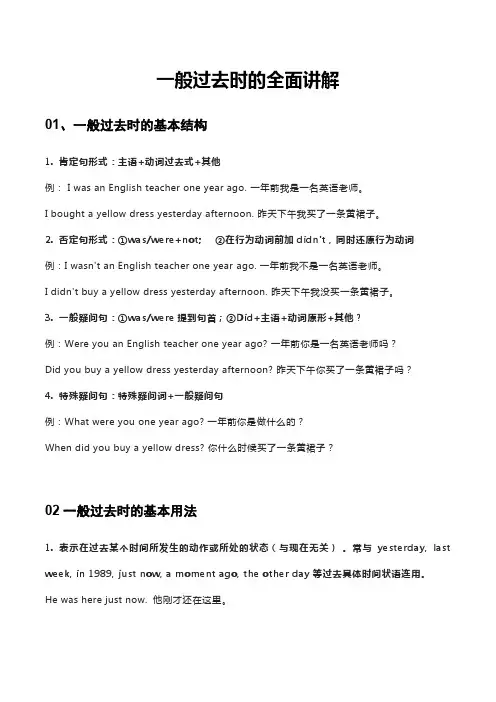
一般过去时的全面讲解01、一般过去时的基本结构1. 肯定句形式:主语+动词过去式+其他例: I was an English teacher one year ago. 一年前我是一名英语老师。
I bought a yellow dress yesterday afternoon. 昨天下午我买了一条黄裙子。
2. 否定句形式:①was/were+not; ②在行为动词前加didn't,同时还原行为动词例:I wasn't an English teacher one year ago. 一年前我不是一名英语老师。
I didn't buy a yellow dress yesterday afternoon. 昨天下午我没买一条黄裙子。
3. 一般疑问句:①was/were提到句首;②Did+主语+动词原形+其他?例:Were you an English teacher one year ago? 一年前你是一名英语老师吗?Did you buy a yellow dress yesterday afternoon? 昨天下午你买了一条黄裙子吗?4. 特殊疑问句:特殊疑问词+一般疑问句例:What were you one year ago? 一年前你是做什么的?When did you buy a yellow dress? 你什么时候买了一条黄裙子?02一般过去时的基本用法1. 表示在过去某个时间所发生的动作或所处的状态(与现在无关)。
常与yesterday, last week, in 1989, just now, a moment ago, the other day等过去具体时间状语连用。
He was here just now. 他刚才还在这里。
What did you do yesterday? 你昨天做了什么事?2. 在过去一段时间内的经常性或习惯性动作。
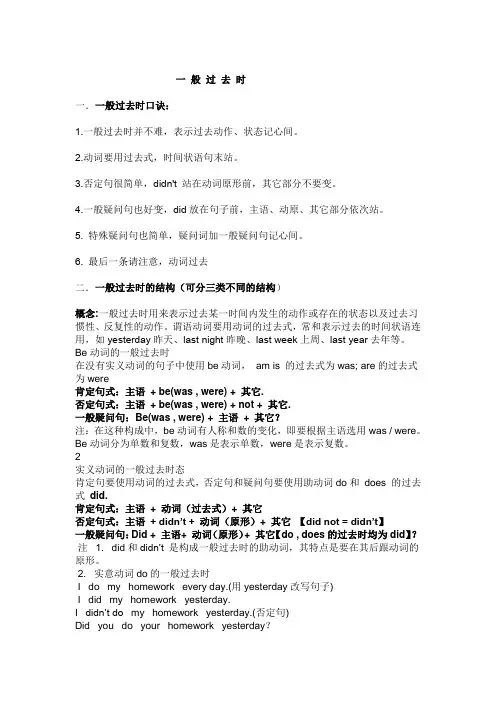
一般过去时一.一般过去时口诀:1.一般过去时并不难,表示过去动作、状态记心间。
2.动词要用过去式,时间状语句末站。
3.否定句很简单,didn't 站在动词原形前,其它部分不要变。
4.一般疑问句也好变,did放在句子前,主语、动原、其它部分依次站。
5. 特殊疑问句也简单,疑问词加一般疑问句记心间。
6. 最后一条请注意,动词过去二.一般过去时的结构(可分三类不同的结构)概念:一般过去时用来表示过去某一时间内发生的动作或存在的状态以及过去习惯性、反复性的动作。
谓语动词要用动词的过去式,常和表示过去的时间状语连用,如yesterday昨天、last night昨晚、last week上周、last year去年等。
Be动词的一般过去时在没有实义动词的句子中使用be动词,am is 的过去式为was; are的过去式为were肯定句式:主语+ be(was , were) + 其它.否定句式:主语+ be(was , were) + not + 其它.一般疑问句:Be(was , were) + 主语+ 其它?注:在这种构成中,be动词有人称和数的变化,即要根据主语选用was / were。
Be动词分为单数和复数,was是表示单数,were是表示复数。
2实义动词的一般过去时态肯定句要使用动词的过去式,否定句和疑问句要使用助动词do和does 的过去式did.肯定句式:主语+ 动词(过去式)+ 其它否定句式:主语+ didn’t + 动词(原形)+ 其它【did not = didn’t】一般疑问句:Did + 主语+ 动词(原形)+ 其它【do , does的过去时均为did】?注 1. did和didn’t 是构成一般过去时的助动词,其特点是要在其后跟动词的原形。
2. 实意动词do的一般过去时I do my homework every day.(用yesterday改写句子)I did my homework yesterday.I didn’t do my homework yesterday.(否定句)Did you do your homework yesterday?Yes ,I did. /No, I didn’t.(一般疑问句)3情态动词的一般过去时态情态动词的过去式:can→could , may→might , must→must ,will-would,should-should。
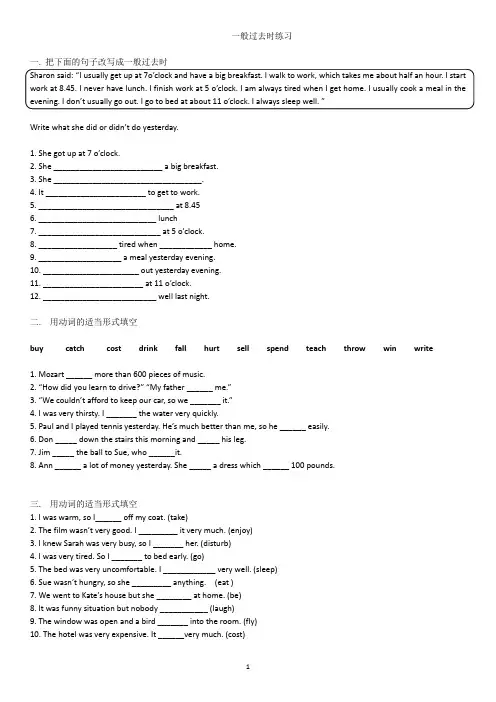
一般过去时练习一. 把下面的句子改写成一般过去时Sharon said: “I usually get up at 7o’clock and have a big breakfast. I walk to work, which takes me about half an hour. I start work at 8.45. I never have lunch. I finish work at 5 o’clock. I am always tired when I get home. I usually cook a meal in the evening. I don’t usually go out. I go to bed at about 11 o’clock. I always sleep well. ”Write what she did or didn’t do yesterday.1. She got up at 7 o’clock.2. She _________________________ a big breakfast.3. She __________________________________.4. It _______________________ to get to work.5. _______________________________ at 8.456. ___________________________ lunch7. ____________________________ at 5 o’clock.8. __________________ tired when ____________ home.9. ___________________ a meal yesterday evening.10. ______________________ out yesterday evening.11. _______________________ at 11 o’clock.12. __________________________ well last night.二. 用动词的适当形式填空buy catch cost drink fall hurt sell spend teach throw win write1. Mozart ______ more than 600 pieces of music.2. “How did you learn to drive?”“My father ______ me.”3. “We couldn’t afford to keep our car, so we _______ it.”4. I was very thirsty. I _______ the water very quickly.5. Paul and I played tennis yesterday. He’s much better than me, so he ______ easily.6. Don _____ down the stairs this morning and _____ his leg.7. Jim _____ the ball to Sue, who ______it.8. Ann ______ a lot of money yesterday. She _____ a dress which ______ 100 pounds.三. 用动词的适当形式填空1. I was warm, so I______ off my coat. (take)2. The film was n’t very good. I _________ it very much. (enjoy)3. I knew Sarah was very busy, so I _______ her. (disturb)4. I was very tired. So I _______ to bed early. (go)5. The bed was very uncomfortable. I ____________ very well. (sleep)6. Sue wasn’t hungry, so she _________ anything. (eat )7. We went to Kate’s house but she ________ at home. (be)8. It was funny situation but nobody ___________ (laugh)9. The window was open and a bird _______ into the room. (fly)10. The hotel was very expensive. It ______very much. (cost)四. 你刚度假回来,别人问了很多关于你的假期的问题。
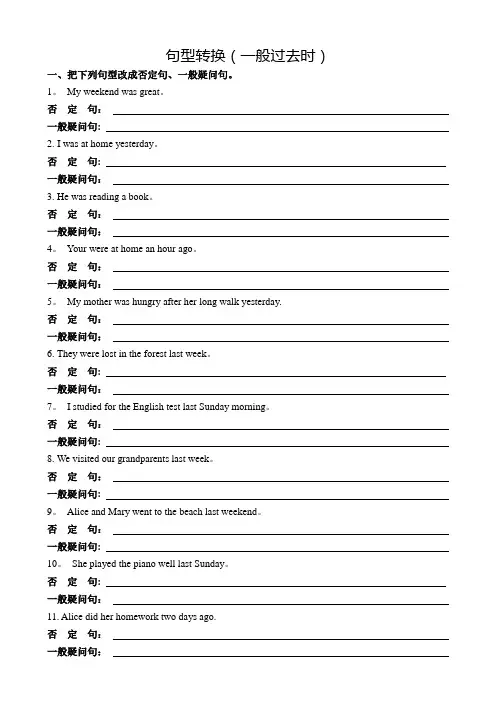
句型转换(一般过去时)一、把下列句型改成否定句、一般疑问句。
1。
My weekend was great。
否定句:一般疑问句:2. I was at home yesterday。
否定句:一般疑问句:3. He was reading a book。
否定句:一般疑问句:4。
Your were at home an hour ago。
否定句:一般疑问句:5。
My mother was hungry after her long walk yesterday.否定句:一般疑问句:6. They were lost in the forest last week。
否定句:一般疑问句:7。
I studied for the English test last Sunday morning。
否定句:一般疑问句:8. We visited our grandparents last week。
否定句:一般疑问句:9。
Alice and Mary went to the beach last weekend。
否定句:一般疑问句:10。
She played the piano well last Sunday。
否定句:一般疑问句:11. Alice did her homework two days ago.否定句:一般疑问句:12。
I helped Lucy with her Chinese just now.否定句:一般疑问句:13。
He did some reading last night.否定句:一般疑问句:14. I cleaned my room yesterday morning.否定句:一般疑问句:二、对划线部分提问。
1. My vacation was great.your vacation?2. I was at home an hour ago?an hour ago?3. He was in the school last year。
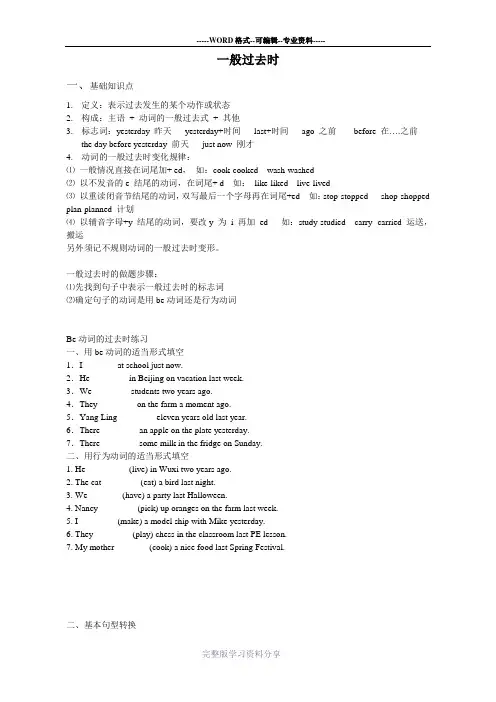
一般过去时一、基础知识点1.定义:表示过去发生的某个动作或状态2.构成:主语+ 动词的一般过去式+ 其他3.标志词:yesterday 昨天yesterday+时间last+时间ago 之前before 在….之前the day before yesterday 前天just now 刚才4.动词的一般过去时变化规律:⑴一般情况直接在词尾加+ ed,如:cook-cooked wash-washed⑵以不发音的e 结尾的动词,在词尾+ d 如:like-liked live-lived⑶以重读闭音节结尾的动词,双写最后一个字母再在词尾+ed 如:stop-stopped shop-shopped plan-planned 计划⑷以辅音字母+y 结尾的动词,要改y 为i 再加ed 如:study-studied carry- carried 运送,搬运另外须记不规则动词的一般过去时变形。
一般过去时的做题步骤:⑴先找到句子中表示一般过去时的标志词⑵确定句子的动词是用be动词还是行为动词Be动词的过去时练习一、用be动词的适当形式填空1.I _______ at school just now.2.He ________ in Beijing on vacation last week.3.We ________ students two years ago.4.They ________ on the farm a moment ago.5.Yang Ling ________ eleven years old last year.6.There ________ an apple on the plate yesterday.7.There ________ some milk in the fridge on Sunday.二、用行为动词的适当形式填空1. He _________ (live) in Wuxi two years ago.2. The cat ________ (eat) a bird last night.3. We _______ (have) a party last Halloween.4. Nancy ________ (pick) up oranges on the farm last week.5. I ________ (make) a model ship with Mike yesterday.6. They ________ (play) chess in the classroom last PE lesson.7. My mother _______ (cook) a nice food last Spring Festival.二、基本句型转换1.一般过去时的否定句构成:有be 动词和没有be 动词两种情况⑴如果有be动词,要先找到be 动词,再在be动词后加not即主语+ be + not + 其他举例:She was very happy.分析:She 为句子主语,was 为be 动词,故She was not very happy. was not= wasn’t⑵如果没有be 动词,我们就要借用助动词didn’t, 并放在动词前面。
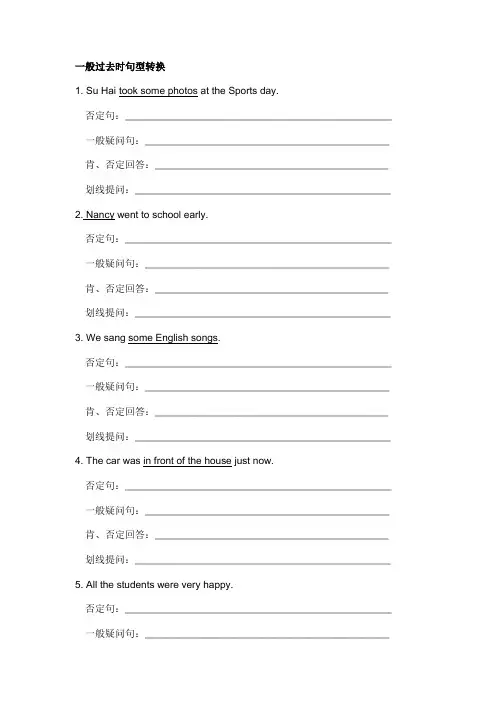
一般过去时句型转换1. Su Hai took some photos at the Sports day.否定句:________________________________________________ 一般疑问句:____________________________________________ 肯、否定回答:__________________________________________ 划线提问:______________________________________________ 2. Nancy went to school early.否定句:________________________________________________ 一般疑问句:____________________________________________ 肯、否定回答:__________________________________________ 划线提问:______________________________________________ 3. We sang some English songs.否定句:________________________________________________ 一般疑问句:____________________________________________ 肯、否定回答:__________________________________________ 划线提问:______________________________________________ 4. The car was in front of the house just now.否定句:________________________________________________ 一般疑问句:____________________________________________ 肯、否定回答:__________________________________________ 划线提问:______________________________________________ 5. All the students were very happy.否定句:________________________________________________ 一般疑问句:____________________________________________6.They were in his pocket.否定句:________________________________________________ 一般疑问句:____________________________________________ 肯、否定回答:__________________________________________ 划线提问:______________________________________________ 7. They played football in the playground.否定句:________________________________________________ 一般疑问句:____________________________________________ 肯、否定回答:__________________________________________ 划线提问:______________________________________________ 8. He went out ten minutes ago.否定句:________________________________________________ 一般疑问句:____________________________________________ 肯、否定回答:__________________________________________ 划线提问:______________________________________________ 9. I bought a VCD last month.否定句:________________________________________________ 一般疑问句:____________________________________________ 肯、否定回答:__________________________________________ 划线提问:______________________________________________ 10.The children had a good time in the park.否定句:________________________________________________ 一般疑问句:____________________________________________划线提问:______________________________________________ 11. Ann did her homework yesterday evening.否定句:________________________________________________ 一般疑问句:____________________________________________ 肯、否定回答:__________________________________________ 划线提问:______________________________________________ st week I read an English book.否定句:________________________________________________ 一般疑问句:____________________________________________ 肯、否定回答:__________________________________________ 划线提问:______________________________________________ 13. My brother was in the zoo just now.否定句:________________________________________________ 一般疑问句:____________________________________________ 肯、否定回答:__________________________________________ 划线提问:______________________________________________ 14.She had some bread for lunch today.否定句:________________________________________________ 一般疑问句:____________________________________________ 肯、否定回答:__________________________________________ 划线提问:______________________________________________ 15.There were some flowers in the garden.否定句:________________________________________________一般疑问句:____________________________________________ 肯、否定回答:__________________________________________ 16. She could finish her homework by herself.否定句:________________________________________________ 一般疑问句:____________________________________________ 肯、否定回答:__________________________________________ 17. They were good friend .否定句:________________________________________________ 一般疑问句:____________________________________________ 肯、否定回答:__________________________________________ 划线提问:______________________________________________ 18.We saw a film with our teacher.否定句:________________________________________________ 一般疑问句:____________________________________________ 肯、否定回答:__________________________________________ 划线提问:______________________________________________ 19. We listened to music the whole night .否定句:________________________________________________ 一般疑问句:____________________________________________ 肯、否定回答:__________________________________________ 划线提问:______________________________________________ 20. She arrived there at 9:00 that day .否定句:________________________________________________ 一般疑问句:____________________________________________。
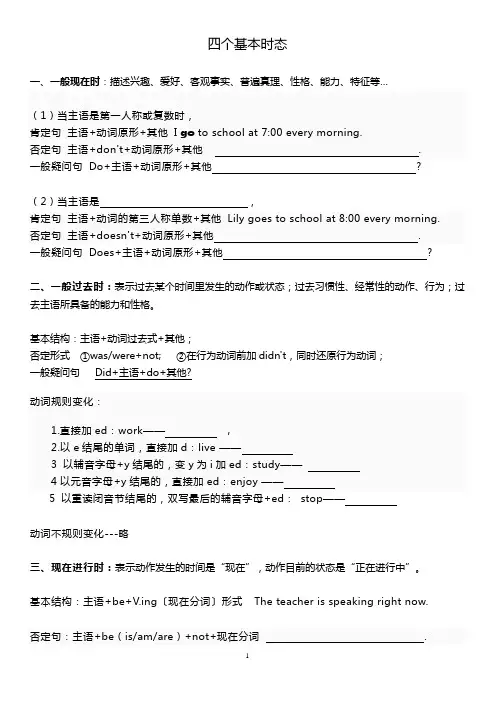
四个基本时态一、一般现在时:描述兴趣、爱好、客观事实、普遍真理、性格、能力、特征等…(1)当主语是第一人称或复数时,肯定句主语+动词原形+其他I go to school at 7:00 every morning.否定句主语+don't+动词原形+其他.一般疑问句Do+主语+动词原形+其他?其他?二、一般过去时:表示过去某个时间里发生的动作或状态;过去习惯性、经常性的动作、行为;过去主语所具备的能力和性格。
基本结构:主语+动词过去式+其他;否定形式①was/were+not; ②在行为动词前加didn't,同时还原行为动词;一般疑问句Did+主语+do+其他?5 以重读闭音节结尾的,双写最后的辅音字母+ed:stop——动词不规则变化---略三、现在进行时:表示动作发生的时间是“现在”,动作目前的状态是“正在进行中”。
基本结构:主语+be+V.ing〔现在分词〕形式The teacher is speaking right now.+Sth? .四、一般将来时:表示将来某一时刻的动作或状态,或将来某一段时间内经常的动作或状态。
常常和表示将来的时间状语连用。
如:tomorrow(明天),next week(下周),from now on(从现在开始);in the future(将来)等。
(1)“will+动词原形”表示将来发生的事情,用于征求对方的意见或表示客气的邀请。
We will go to Disneyland next month.(2).“be going to+动词原形”表示即将发生的或最近打算进行的事。
例如We're going to meet outside the school gate. 我们打算在校门口见面。
Look! . 瞧!快下雨了。
(3)be about to 表示即将发生的动作,意为:很快,马上。
They leave. (=They're going to leave.) 他们就要走了。
一般过去时的用法一、概念一般过去时表示过去某个时间发生的动作或存在的状态,常和表示过去的时间状语连用;如:yesterday,yesterday morning,yesterday afternoon,yesterday evening,the day before yesterday前天,last night,last week,last month, last year,a moment ago刚才,just now刚才,two days ago,a week ago,in 1990等;如:I went to bed at eleven last night. 昨晚我11:00睡觉;一般过去时也表示过去经常或反复发生的动作;二、句式变化:1.表示过去某个时间里发生的动作,或过去经常或反复发生的动作;行为动词肯定陈述句句型: 主语+ 动词过去式+其它;I visited my uncle yesterday. 昨天我拜访了我的叔叔;否定陈述句句型: 主语+didn’t + 动词原型+其它;I didn’t visit my uncle yesterday.一般疑问句句型:Did + 主语+ 动词原形Did you visit your uncle yesterday肯定回答:Yes, 主语+ did.Yes, I did.否定回答:No, 主语+ didn’t.No, I didn’t.特殊疑问句句型:特殊疑问词+ did +主语+ 动词原形+其它What did you do yesterday2.表示某个时间里存在的状态.系动词be肯定陈述句句型:主语+ be过去式was/were+其它;They were in the classroom just now.否定陈述句句型: 主语+ be的过去式+not wasn’t/weren’t+其它;They weren’t in the classroom just now.一般疑问句句型:Was/Were + 主语+ 其它Were they in the classroom just now肯定回答:Yes, 主语+ was/were.Yes, they were.否定回答:No, 主语+ wasn’t/weren’t.No, they weren’t.特殊疑问句句型:特殊疑问词+ was /were+主语+其它Where were they just now三、动词过去式的构成规律一规则动词的过去式1.以不发音e结尾的动词,在词尾直接加-d;live→lived use→used taste-tasted 2.以“辅音字母+ y”结尾的动词,先将y 改为i ,再加–ed;study→studied, tr y→tried fly→flied3.以重读闭音节即辅音+元音+辅音或r音节结尾,末尾只有一个辅音字母的动词,要先双写这个辅音字母后,再加–ed;stop→stopped ,plan→planned, prefer→preferred4.一般情况下,在动词原形后面加-ed;清辅音后读/t/,浊辅音和元音后读/d/. /t/ 和/d/后读/id/.look→looked play→played start→started visit→visited二不规则动词的过去式am/is---was are—were go-went swim—swam fly---flew do---did have---hadsay---said see---saw take---took come---came get---got draw---drew sing---sang read---read eat---ate tell---told sit---sat let---let cut---cut leave---left think---thought run---ran find---found wear---wore buy---bought write---wrote make---made一、用行为动词的适当形式填空1. He _____ live in Wuxi two years ago.2. The cat ____ eat a bird last night.3. We _____ have a party last Halloween. 5. I _____ make a model ship with Mike yesterday.4. Nancy _____ pick up oranges on the farm last week.6. They _____ play chess in the classroom last PE lesson.7. My mother ____ cook a nice food last Spring Festival.8. The girls _____ sing and _____ dance at the party.9. What _____ she ____ find in the garden last morning She ____ find a beautiful butterfly.10. ____ he ____ the flowers this morning Yes, he _____. water11. ____ you ____ visit your relatives last Spring Festival12. ____ he ____ fly a kite on Sunday Yes, he _____.二.用be动词的适当形式填空____ at school just now. 2.He ____ at the camp last week.____ students two years ago. 4.They ___ on the farm a moment ago.Ling ____eleven years old last year. 7.She _____ happy yesterday.___ an apple on the plate yesterday.8.There ___ some milk in the fridge on Sunday.9.The mobile phone __ on the sofa yesterday evening.10.They ____ glad to see each other last month.11.Today ____ the second of June. Yesterday ____ the first of June.It _____Childr en’s Day. All the students _____ very excited. 、三.用动词的适当形式填空1. It ____ be Ben’s birthday last Friday.2. We all _____ have a good time last night.3. He ____ jump high on last Sports Day.4. Helen ____ milk a cow on Friday.5. It ____ be the 2nd of November yesterday.6. She likes _____ newspapers, but she _____ a book yesterday. read7. He _____ football now, but they _____ basketball just now. play8. Jim’s mother _____ plant trees just now.9. ____ they ____ sweep the floor on Sunday No, they _____.10. I ____ watch a cartoon on Monday. 11. We _____ go to school on Sunday.四、用一般过去时填空1、I ____go to the cinema last Saturday. is ill yesterday.3、We ____ have a lesson yesterday.4、What ___your uncle ____do yesterday morning He _read English.5、She _____clean our classroom yesterday afternoon.五.句型转换played football in the playground.否定句:________________________________________________一般疑问句:____________________________________________肯、否定回答:__________________________________________2.It was exciting.否定句:__________________.一般疑问句:_________________. 肯、否定回答:_______________________________________.3. All the students were very excited.否定句:________________________________________________一般疑问句:____________________________________________ 肯、否定回答:__________________________________________ 4. They took many pictures in Beijing last Saturday.否定句:____________________________________________一般疑问句:____________________________________________ 肯、否定回答:__________________________________________ 5. There was a car in front of the house just now.否定句:________________________________________________一般疑问句:____________________________________________ 肯、否定回答:__________________________________________ 六、中译英、1.我的故事书刚才还在手表旁边;2. 你上周在哪儿在野营基地;_________________________________________________________ 3.一会以前花园里有两只小鸟;___________________________4. 格林先生去年住在中国;__________________________________5. 昨天我们参观了农场;__________________________________七、根据文答句写出问句;1、I did my homework yesterday. 3、八、用动词的适当形式填空1. I _____ watch a cartoon on Saturday.2. Her father ____ read a newspaper last night.3. We _____ to zoo yesterday, we ____ to the park. go4. Gao Shan _____ pull up carrots last National Day holiday.5. I _____ sweep the floor yesterday, but my mother _____.九、中译英1. 我们上周五看了一部电影;_________________________________________________________ 2. 他上个中秋节走亲访友了吗是的;_________________________________________________________ 3. 你们上个儿童节做了什么我们参观了动物园;_________________________________________________________ 4. 他的朋友在照看他的弟弟;_________________________________________________________ 5. 去年端午节我们没去看了龙舟比赛;_________________________________________________________ 6. 他在音乐课上拉小提琴了吗不,没有;_________________________________________________________十、用动词的适当形式填空1. It ____ be the 2nd of November yesterday.Mr White ____ go to his office by car.2. Gao Shan _____ put the book on his head a moment ago.3. Don’t _____ the house. Mum ____ it yesterday. clean4. What ____ you _____ just now I _____ some housework. do5. They _____ make a kite a week ago.6. I want to _____ apples. But my dad _____ all of them last month. pick7. She ____ be a pretty girl. Look, she ____ do Chinese dances.8. The students often ____ draw some pictures in the art room.____ Mike do on the farm He ____ cows. milk。
一般过去时句型
一般过去时是英语中表示过去发生的动作或状态的一种时态。
以下是一些常见的一般过去时的句型:
1. 肯定句:主语 + 动词过去式(例如:I walked to school yesterday.)
2. 否定句:主语 + did not (didn't) + 动词原形(例如:She didn't go to the party last night.)
3. 疑问句:Did + 主语 + 动词原形?(例如:Did you watch the movie last night?)
4. 特殊疑问句:特殊疑问词 + did + 主语 + 动词原形?(例如:What did you do yesterday?)
5. 简单过去时的时间状语:yesterday, last week, in 2010等(例如:I went to Paris last year.)
6. 简单过去时的被动语态:was/were + 动词的过去分词 (例如:The book was written by Mark Twain.)
7. 简单过去时的完成时态:had + 动词的过去分词 (例如:He had finished his homework before dinner.)
8. 简单过去时的进行时态:was/were + 现在分词 (例如:They were watching TV when
I arrived.)。
1.一般过去时表示过去某个时间发生的动作或存在的状态,常和表示过去的时间状语连用。
一般过去时也表示过去经常或反复发生的动作感谢。
2.Be动词在一般过去时中的变化:⑴am 和is在一般过去时中变为was。
(was not=wasn’t)⑵are在一般过去时中变为were。
(were not=weren’t)⑶带有was或were的句子,其否定、疑问的变化和is, am, are一样,即否定句在was或were 后加not,一般疑问句把was或were调到句首。
3.句中没有be动词的一般过去时的句子否定句:didn’t +动词原形,如:Jim didn’t go home yesterday.一般疑问句:在句首加did,句子中的动词过去式变回原形。
如:Did Jim go home yesterday?特殊疑问句:⑴疑问词+did+主语+动词原形?如:What did Jim do yesterday?⑵疑问词当主语时:疑问词+动词过去式?如:Who went to home yesterday?动词过去式变化规则:1.一般在动词末尾加-ed,如:pull-pulled, cook-cooked2.结尾是e加d,如:taste-tasted3.末尾只有一个元音字母和一个辅音字母的重读闭音节,应双写末尾的辅音字母,再加-ed,如:stop-stopped4.以“辅音字母+y”结尾的,变y为i,再加-ed,如:study-studied5.不规则动词过去式:am,is-was are-were, do-did, see-saw, say-saidgive-gave, get- got, go-went, come-came, have-had,eat-ate, take-took, run-ran, sing-sang, put-put,make-made, read-read, write-wrote, draw-drew, drink-drank,fly-flew, ride-rode, speak-spoke, sweep-swept, buy-boughtswim-swam, sit-sat bring--brought can-could cut-cutbecome-became begin-began draw-drew feel-felt find-foundforget-forgot hear-heard keep-kept know-knewlearn-learnt (learned) leave-left let-let lose-lostmeet-met read-read sleep-slept speak-spoke take-tookteach-taught tell-told write-wrote wake-woke think-thought过去时练习:写出下列动词的过去式is\am_________ fly_______ plant________ are ________ drink_________play_______ go________ make ________ does_________ dance________worry________ ask _____ taste_________ eat__________ draw________put ______ throw________ kick_________ pass_______ do ________一、用be动词的适当形式填空。
一般过去时的用法及结构1.一般过去时的基本用法一般过去时表示过去某个时间发生的动作或存在的状态,也可表示过去经常或反复发生的动作。
常和表示过去的时间状语连用,如yesterday, last week, last night, in 2003, two days ago 等。
【举例】I got up at 6:30 yesterday. 我昨天6:30起床。
My father was very busy last week. 我父亲上周很忙。
2.一般过去时的基本结构⑴ 肯定句“主语+动词过去式+其他”或者“主语+wa s/were +其他”。
【举例】I played tennis last weekend. 我上周末打网球了。
My school trip was great. 我的学校郊游棒极了。
⑵ 否定句“主语+didn’t+动词原形+其他”或“主语+wasn’t / were n’t+其他”。
【举例】The girl didn’t play computer games yesterday afternoon.这个女孩昨天下午没玩电子游戏。
Old Henry wasn’t happy last Friday. 上星期五老亨利不高兴。
⑶一般疑问句“Did+主语+动词原形+其他?”肯定回答为“Yes,主语+did”,否定回答为公。
,主语+didn’t”或者“Was/Were +主语+其他?”肯定回答为“Yes,主语+wa s /were”,否定回答为“No,主语+wasn’t/were n’t”。
【举例】一Did you go to the beach? 你们去海滩了吗?—Yes, we did./ No, we did n’t. 是的,我们去了。
/不,我们没有。
—Was your weekend OK? 你的周末过得还行吧?—Yes, it was. / No, it wasn’t. 是的,还行。
一般过去时详细讲解与练习题一、巧记一般过去时:动词一般过去时,表示过去发生的事;be用was或用were, have,has变had;谓语动词过去式,过去时间作标志;一般动词加-ed,若是特殊得硬记。
否定句很简单,主语之后didn’t添;疑问句也不难,did放在主语前;不含be动词时如果谓语之前有did,谓语动词需还原;动词若是was,were,否定就把not添。
含be动词时疑问句也不难,要把was,were放在主语前。
二、be的一般过去时:学习动词be的一般过去时,下面有一口诀,它可以帮你们更好地掌握动词be的一般过去时。
be的过去时有四巧:一是时间状语巧,表示过去的短语要记牢;二是形式巧,单数was,复数were;三巧是否定句结构,not紧跟was/were;四是疑问句式巧,was/were向前跑(提前)。
【一巧】时间状语(即标志词)巧。
一般过去时表示过去发生的动作或存在的状态,恰巧与表示过去的一些时间状语连用。
【二巧】形式巧。
它与一般现在时一样,形式多样:当主语是第一人称单数或第三人称单数时,谓语动词用was;主语是第二人称或其他人称复数时,谓语动词用were。
eg: I was in the classroom yesterday morning.昨天早上我在教室里。
He was at school last Tuesday.上周二他在学校。
They were over there a moment ago.刚才他们在那边。
【三巧】否定句结构巧。
与动词be的一般现在时一样,它在动词后面加not即可变成否定句,并且was, were与not可以缩写成wasn't, weren't。
即:主语+ wasn't/ weren't +表语+其他。
例如:I was not (=wasn't) here yesterday.昨天我不在这儿。
My parents were not (=weren't) at home last Sunday.上周日我父母不在家。
一般过去时句型转换:表示过去发生的事情。
is , am →was ;are →were ;do →did ;go→went ;sing → sang;come→came;have→had1.I was born on February 27th, 1999。
否定句:一般疑问句: 特殊疑问句:2.He was born in Bai Lingmiao。
否定句:一般疑问句:特殊疑问句:3.It was rainy yesterday。
否定句:一般疑问句:特殊疑问句:反义疑问句:选择疑问句:(windy)4。
These were their books. 否定句:一般疑问句:特殊疑问句:5.I did my homework yesterday. 否定句: 一般疑问句:特殊疑问句:6。
He went to the park last week。
否定句:一般疑问句:特殊疑问句:反义疑问句:选择疑问句:(the shop)7. She sang some English songs at home last night.否定句:一般疑问句:特殊疑问句:8.Linda went to school on foot yesterday morning。
否定句:一般疑问句:特殊疑问句:反义疑问句:选择疑问句:(by bike)9.They lived in a big house 10 years ago. 否定句: 一般疑问句:特殊疑问句:10.The twins liked swimming last year. 否定句: 一般疑问句:特殊疑问句:反义疑问句:选择疑问句:(running)11.There used to be lots of flowers in the garden years ago.否定句:一般疑问句:特殊疑问句:。
一般过去时句型转换文件管理序列号:[K8UY-K9IO69-O6M243-OL889-F88688]
句型转换
例句:Mr. Green cooked a lot of food on Wednesday.
Mr. Green didn’t cook a lot of food on Wednesday. (改成否定句)
Did Mr. Green cook a lot of food on Wednesday? (改成一般疑问句)
Yes,he did .(肯定回答) No,he didn’t.(否定回答)
What did Mr. Green do on Wednesday? (对划线部分提问)
1.The children played games in the park.
① ②
否定句:
__________________________________________
一般疑问句:
________________________________________
肯定回答:否定回答:_______________
对划线部分提问:①____________________________________
②
2.Ann did her homework yesterday evening.
①②
否定句:__________________________________________
一般疑问句:________________________________________
肯定回答:否定回答:_______________
对划线部分提问:①____________________________________
②
3. I read an English book last week.
否定句:__________________________________________
一般疑问句:________________________________________
肯定回答:否定回答:_______________
对划线部分提问:____________________________________
3.She had some bread for lunch today.
①②
否定句:__________________________________________
一般疑问句:________________________________________ 肯定回答:否定回答:_______________ 对划线部分提问:①_______________________________ ②
5.Su Yang visited a farm two days ago.
否定句:__________________________________________
一般疑问句:________________________________________
肯定回答:否定回答:_______________
对划线部分提问:____________________________________。